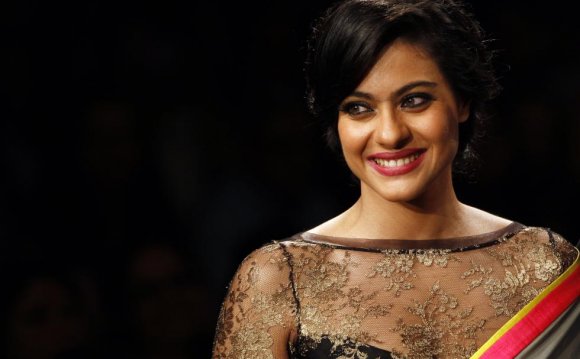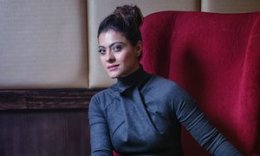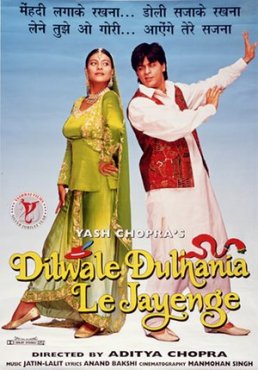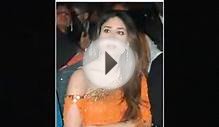
 Kajol: ‘I believe in equality of men and women, but I don’t object to chivalry.’ Photograph: Sarah Lee for the Guardian
Kajol: ‘I believe in equality of men and women, but I don’t object to chivalry.’ Photograph: Sarah Lee for the Guardian
Kajol’s isn’t a quiet presence. She talks fast, laughs loudly, and is uncharacteristically goofy for Bollywood royalty, throwing her hands about so much in a modest London hotel suite that her jewellery flies across the room. The actor, 41, began her career 23 years ago and holds the record for winning best actress (six times, tied with her late aunt Nutan) at the Indian Filmfare awards. She has long been considered one of the country’s most unconventional stars for allegedly not conforming to the industry’s narrow beauty ideals, for twice taking long breaks at the peak of her career, and for berating directors for not casting her in parts written for male leads. She is back to acting, after a five-year hiatus (“looking after my kids, being a wife, mother, human”), with Dilwale. The film marks a much-hyped reunion with Shah Rukh Khan – the couple have made their most successful films together over the past two decades and are consistently voted Indian cinema’s best on-screen couple. Their biggest hit, 1995’s Dilwale Dulhania Le Jayenge (DDLJ), has gone on to be the longest-screened film in Indian cinema history, still showing in Mumbai theatres today.
What’s it like to be back after such a long break?
Well, I do keep having breaks as everyone knows. I’m quite the break person. But it’s great fun. We’ve been shooting in a marathon, six months non stop, and after that long with a crew you want to hit each other and never see those people again. But it’s worth it. I don’t get that same satisfaction doing anything else.
Did you ever worry that taking those breaks and walking away from your huge success as a bankable female lead was a career gamble?
I’m picky; I’ve done very little work compared to my peers. But I can’t work on three films a year. I’ve never felt comfortable doing that. Not at the beginning of my career and definitely not after I got married. [Kajol is married to actor Ajay Devgan. They have a 12-year-old daughter and a five-year-old son.] I need that time out, to look at my kids, go to sleep with them and wake up with them, have breakfast with them. I love my kids, but I like them, too – I need their company to keep me grounded and rooted in every which way.
 Your daughter is almost a teenager now. What have you learned from her and what does she learn from you?
Your daughter is almost a teenager now. What have you learned from her and what does she learn from you?
There is huge pressure for her, as she puts it, with what other girls are doing and are allowed to do at that age – but they have a natural tendency to lie also. I’ve realised that. “Their mothers are letting them do all this, and you’re not letting me do this” – yeah, that’s a good one. Unfortunately for her, I’m in touch with those mothers and I know their daughters are pulling the same trick. But somewhere down the line, you have to give them some leeway. They are in a different world – I cannot compare what my childhood was like with hers. We were way dumber at their age. We thought we were very smart, but we were very dumb. Fortunately for me, my daughter has always been a strong individual, with very strong likes and dislikes, and she is vocal about them.
The press often say the same of you.
[Laughs] I know. Damn. And I have to live with myself!
Bollywood has changed dramatically since you first started, don’t you think?
It has become huge. Even small things like vanity vans [trailers], we didn’t have that 15 years ago. The machinery has taken on a whole new level. Suddenly you have people with specialisms, suddenly everyone’s more professional and it’s feasible to make different kinds of films. There is an array of scripts that aren’t just ideas in people’s heads any more. And it’s not just about the youngest and the best. Thank God that phase is over.
Do you miss not occupying that territory anymore?
No, you grow up. After a point, you get sick of running around the trees. There’s only so much thoughtlessness you can manage in your career – you have to be at that stage and in that frame of mind to do it. I often get: “Oh my God, why didn’t you take that part? The role was so good, ” but if I can’t feel a character, if I can’t visualise that, then I’m not the right person for it. It’s difficult to explain to someone when I’m saying no to their script.
For a long time, the industry and its press labelled you an “unconventional” leading lady for having a “duskier” complexion, for not plucking your eyebrows, for having “unkempt” hair, for not being size zero. Did it ever bother you?
[Laughs] I never gave a damn about what anyone said about me. I still don’t. Size zero is in, but I don’t understand it. I might be into the fitness game now, but I never paid attention to it back then. The critics pounce on me a little less now than they would anyone else, I’ve earned that. Plus, I can’t afford to give in to that pressure. It would drive me insane and I would need to be locked up. I’m already mad and probably need locking up anyway!
Your biggest hits – Baazigar, DDLJ, Kuch Kuch Hota Hai, Kabhi Khushi Kabhi Gham, My Name is Khan – have seen you partnered up with Shah Rukh Khan. Audiences can’t get enough of you together. Why?
We’ve known each other for 22 years, we make films together every few years – it’s simple. His energy hasn’t changed. It’s even more apparent, he’s very passionate about it. He has clear ideas of how things should be, but you get better at anticipating another person’s moves and thoughts. I can almost predict how a scene with him is going to go and he can do the same for me. We automatically know that about each other. He has taught me a lot in life.
Hollywood’s female actors have consistently campaigned for there to be more roles for women over 40, and more diversity on screen. How does Bollywood’s record compare?
Thank God for the audiences: their views and tastes have changed and it has allowed the industry to move in a new direction. Movies will always reflect what the audience wants and, as long as they want to see different kinds of films, different kinds of films will be made. I have no complaints.
Do you get asked for advice by younger female actors?
Even if I do, I never give it. Advice is a little too free and easy around the world – everyone has to develop their own way. What I did when I was 18 years old is so different to what someone now might do.
Do you consider yourself a feminist?
I do consider myself a feminist, but I am contrary so I can also be considered the opposite. I believe in the equality of men and women, but I don’t object to chivalry. I believe in it; gender equality should not mean women should be ashamed to be feminine. I don’t believe men are made to rule the world in the same way I don’t believe women should be doormats. But the stigma of not wanting to do things “like a man” or being made to feel stupid in traditional gender roles is dumb.
INTERESTING VIDEO












